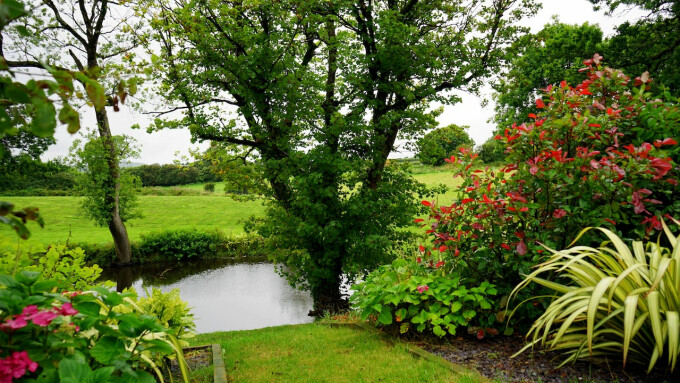The Biblical Narrative: Redemption

BY AUSTIN HESS, Pastoral Intern for Oakwood Presbyterian
When we moved to Lewistown, we knew our house would need a lot of work. It had fallen into disrepair through neglect. Paint was peeling off the walls from layers of old wallpaper. Plumbing didn't quite work the way it should have in our bathroom (not to mention clogged for multiple feet). Stairs squeaked louder than a dog's bark. Radiators flaked (probably lead) paint. Old Romex wiring insulation was unraveling in the walls. Junction boxes in the ceilings were coming loose with every turn of the fan blades. Formica countertops—all 24 inches of it —were finding their way into our food. The heat from our oil furnace was shooting through our roof, not to mention baking our 40-year-old shingles that needed to be replaced. For the past year, we had to identify the problems in our house, remedy them and breathe life back into this once quiet and still house.
We're looking for restoration. We recognize that something is horribly wrong with this world because of the way we are hurt by others and we hurt others. However, God did not leave us to wonder about where redemption would come from. He provided a way of redemption for his people through his only begotten Son the Lord Jesus Christ. In this final post, we'll see how the biblical narrative points to redemption as we read Scripture and live in community.
Reading Redemption
Fall Anticipating
If you read Genesis 3 in the previous post, you'll notice that when God bestowed the covenant curses upon Adam and Eve, he gave them hope:
I will put enmity between you [the serpent] and the woman, and between your offspring and her offspring; he shall bruise your head, and you shall bruise his heel (Genesis 3:15, ESV).
Many commentators call this verse the first gospel of the Bible. For in this passage, all the way from the fall, we have been anticipating redemption and God has not left us without hope, a purpose, or a plan.
Jesus
The person referenced in Genesis 3:15 is none other than Jesus. The one whom we regularly confess is God's only Son, our Lord. He was conceived by the Holy Spirit and born of the Virgin Mary. He suffered under Pontius Pilate. He was crucified, died, and was buried. He felt the effects of our sin, he experienced misery, all for us—to redeem God's people from their own sin and misery.
However, He did not stay dead, but on the third day, he arose again from the dead. He ascended into heaven. He sits at the right hand of God the Father from where he will come to judge the living and the dead at the last day.
The person promised all the way back in Genesis 3—the serpent crusher—fulfilled what was promised by stepping and crushing Satan's head, thereby taking away the power of death. For through his physical death he tasted eternal spiritual death for us, so that through our physical death we may taste eternal spiritual life forever. That's the hope of the gospel.
New Creation
People have asked me what my favorite passage is in Scripture and I struggle to answer this question because I have so many favorites! Perhaps my most favorite passage can be found in Colossians 1:15-23.[1]
This passage, a sort of hymn, describes in a poetic fashion the preeminence of Jesus over all things—creation and his people. In this passage, Paul recites how Jesus sustains and holds all things together. But, most importantly, how he has reconciled "all things" to himself—God's people and God's creation.
Often, when we talk about redemption, we talk about the redemption of souls. This is true, but only a part of the gospel. When you put Jesus' redeeming acts in the context of the whole sweep of the biblical narrative, all the way back to Genesis 1 and 2, you see that His redemptive acts have extended to not just our souls, but to our physical bodies and the entirety of God's creation:
…and through him to reconcile to himself all things, whether on earth or in heaven, making peace by the blood of his cross (Colossians 3:15, ESV, emphasis added).
However, our ultimate goal is not to get back to the Garden of Eden, but to get to the New Jerusalem. Our journey is forward, not backward. For in the New Jerusalem, the possibility of sin will never exist (like in the Garden), and each one of us will have a Garden of Eden to tend —a place where we can cultivate the potential of what God has given us (Revelation 21:9-26).
Already/Not Yet
The story of the Bible is our story by faith and history. We know that God created all things good, but everything is tainted by sin and misery. We know that Jesus' life, death, resurrection, and ascension accomplished redemption, but we still experience sin and misery.
Right now, we live in this tension that theologians have called the "already/not yet." Meaning, we enjoy the benefits of a proper relationship with God, but we still look forward to the day when that relationship will be completely unhindered by sin. During this time, we are called to live and fulfill God's original intention for us.
Redeemed Community
What are we to do now? First, we are called to proclaim the gospel through Word and deed. The same gospel message that awakened you to your own need for repentance is the same gospel message that the world needs. They need to know who God is, who they are, why the world is this way, and how they can be redeemed from their sin and misery.
The world is hurting and desperately needs to see the hands and feet of Jesus through service. This message can come from the actual sharing of the Gospel, or it can come from meeting needs (Luke 7:36-49).
Gospel proclamation seems really intimidating—putting yourself out there to share a message of hope that may very well lead to you being rejected and verbally battered. A lot of evangelistic training methods and programs have attempted to help people through this fear by providing words of comfort as well as a framework to fall back on in order to meet objections and ensure a right presentation of the gospel.
However, increasingly, I think the most radical and effective form of evangelism that we can have in our communities is simply to be hospitable to our neighbors in our communities. Time and time again in Luke's gospel, we see Jesus sitting down and eating and drinking with those whom the religious elite would not dare to associate. Through sharing meals, Jesus would disarm the most sinful and the most skeptical in order to give words of life.
In the same way, the simple act of having others in your home and sharing a meal with them disarms them by showing the love of Jesus, enabling the reception of his message of hope for the world.[2]
The Narrative
If we're ever lost in reading Scripture, this narrative helps to reorient us in the direction we are to go and situates us to where we are in the story. If we're ever confused by what we're called to do or trying to make sense of what in the world is going on, this narrative gives us context and hope for what's going on and what's to come.
The biblical narrative—Creation, Fall, Redemption—is the basic storyline of the Bible and the storyline we inhabit even today. In this storyline, we see how God has created all things, but the fall subjected them to sin and misery, so God takes steps to redeem his original creation from their sin and misery by bringing it into redemption.
Further Reading
- Allender, Dan B.: The Healing Path: How the Hurts in Your Past Can Lead You to a More Abundant Life. Colorado Springs, Colorado: WaterBrook Press, 1999. This work guides you through how your past hurts—your sin and misery—can be used to guide your focus on redemption and ministering to others in the midst of their pain. You can also check out Henri Nouwen's briefer work The Wounded Healer.
- Doriani, Daniel M.: Work. My professor's work on work uses the biblical narrative and the cultural mandate at the beginning of the Bible to give a realistic perspective on its value. You can also check out Tim Keller's book Every Good Endeavor.
- Forester, Greg: Joy for the World. Greg's book is a bit of a historical analysis of how Christianity lost its cultural influence in the United States and gives specific and practical advice on how to reclaim it (but, not in the ways you expect).
- Wright, Nicholas Thomas: Surprised by Hope: Rethinking Heaven, the Resurrection, and the Mission of the Church. New York: HarperOne, 2014. One of the most paradigm-shifting ideas I went through revolved around redemption and new creation, and it largely had to do with how I applied the biblical narrative. Wright, in his abbreviated work, guides you through how we got to our worldview, and what the biblical worldview really is.
Endnotes
- I'll probably change my mind after this post is published.
- One of the best stories out there right now of this "method" of evangelism is found in Rosaria Butterfield's recent work The Gospel Comes with a House Key.

